Unit 9 Have you ever been to a museum?单元复习课件 八年级英语下册同步备课系列(人教版)
文档属性
| 名称 | Unit 9 Have you ever been to a museum?单元复习课件 八年级英语下册同步备课系列(人教版) |  | |
| 格式 | pptx | ||
| 文件大小 | 17.6MB | ||
| 资源类型 | 试卷 | ||
| 版本资源 | 人教新目标(Go for it)版 | ||
| 科目 | 英语 | ||
| 更新时间 | 2024-04-14 14:06:48 | ||
图片预览

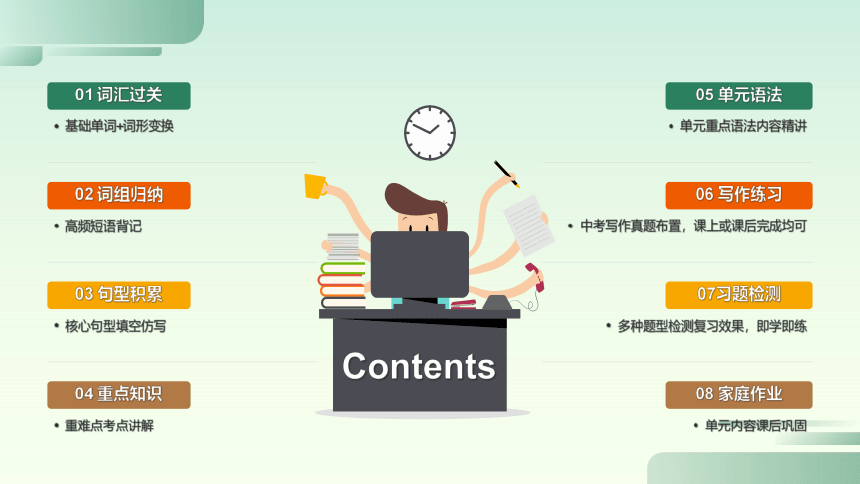

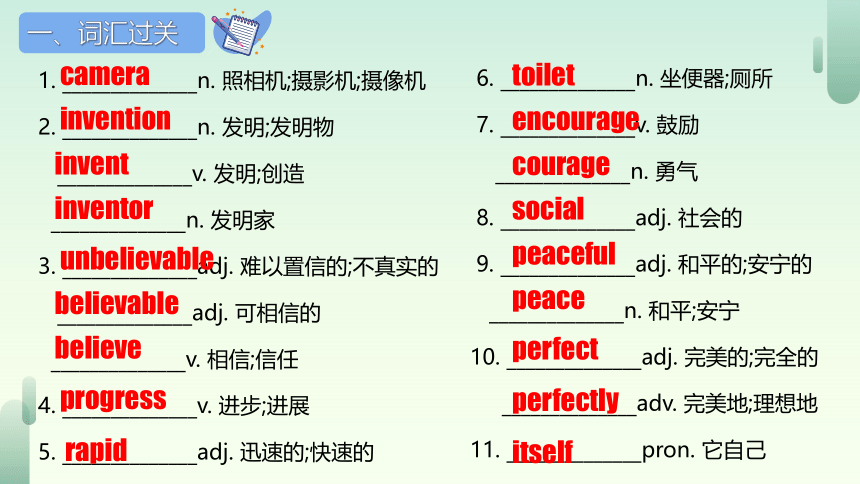
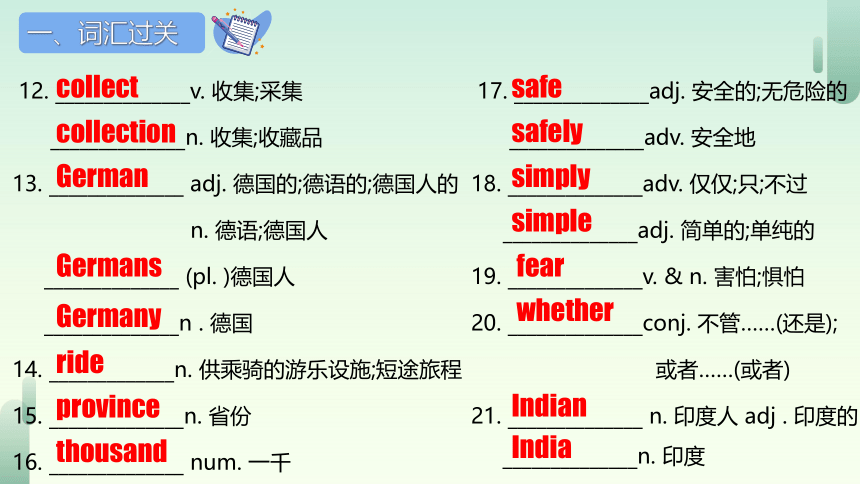
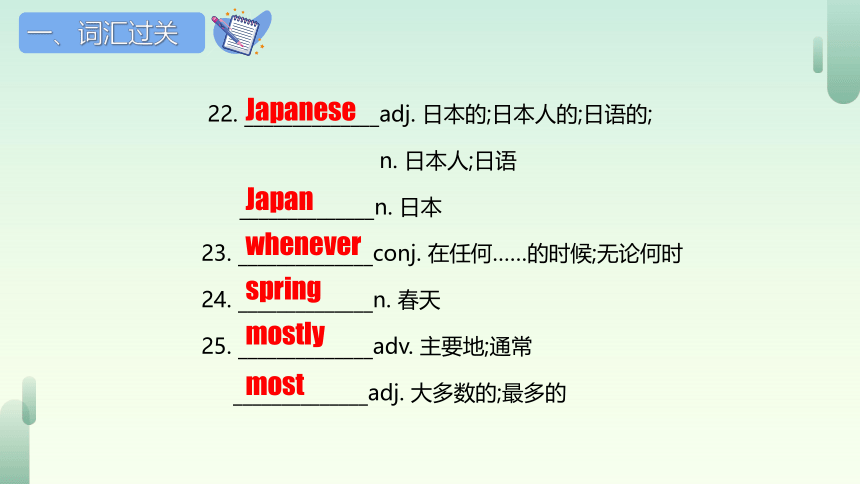

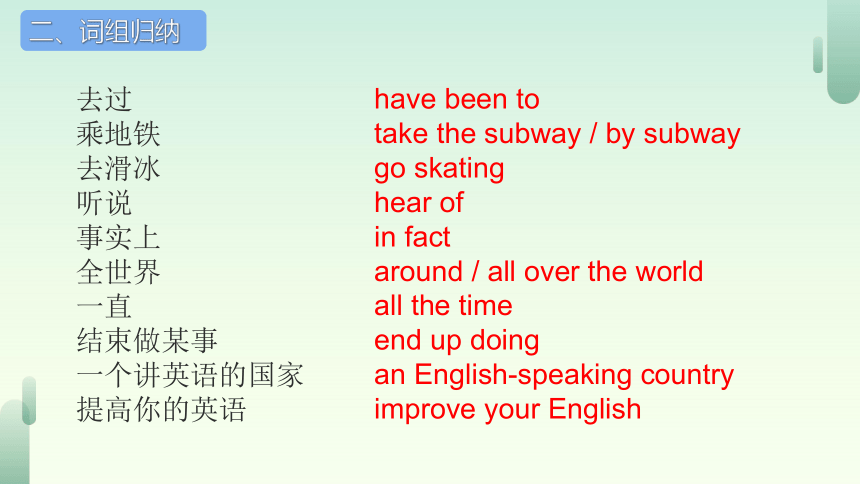
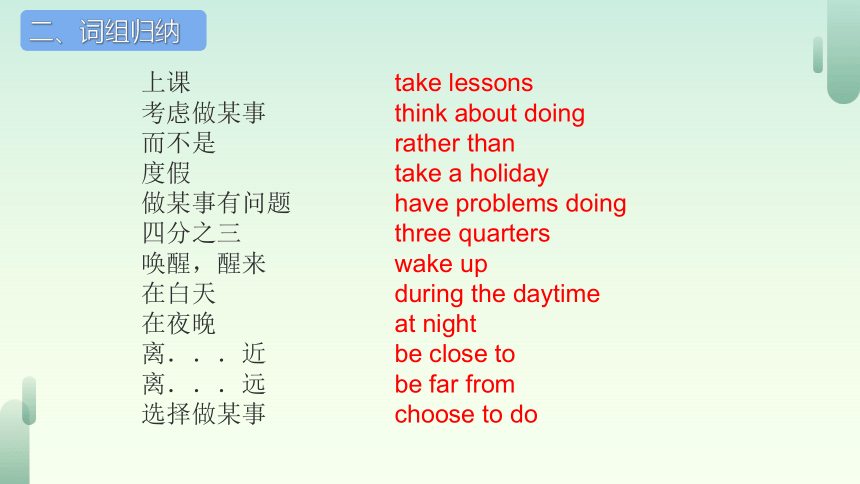

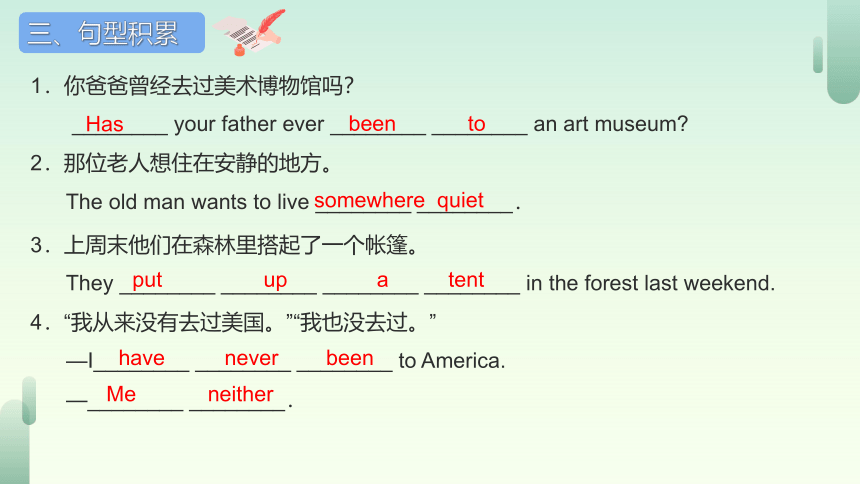
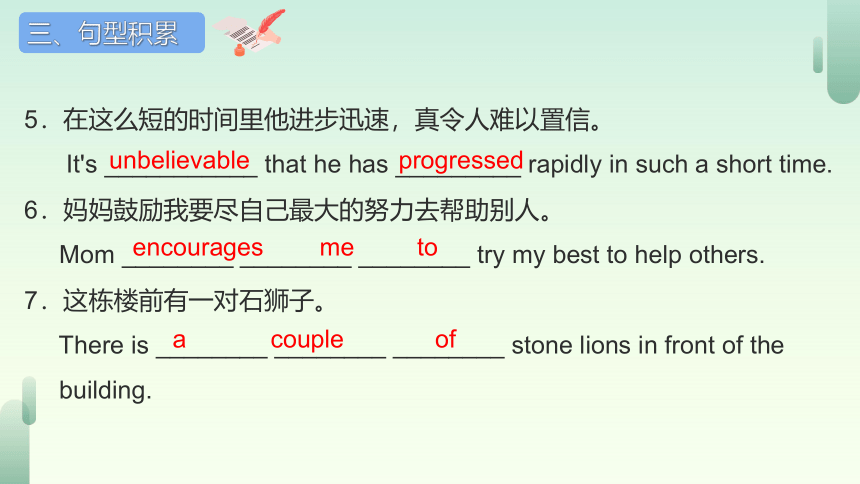
文档简介
(共50张PPT)
Unit 9
Have you ever been to a museum ?
Review
课型:复习课
主讲人:XXX
01 词汇过关
基础单词+词形变换
02 词组归纳
高频短语背记
03 句型积累
核心句型填空仿写
04 重点知识
重难点考点讲解
05 单元语法
单元重点语法内容精讲
06 写作练习
中考写作真题布置,课上或课后完成均可
07习题检测
多种题型检测复习效果,即学即练
08 家庭作业
单元内容课后巩固
Contents
01 词汇过关
Words
一、词汇过关
1. ______________n. 照相机;摄影机;摄像机
2. ______________n. 发明;发明物
______________v. 发明;创造
______________n. 发明家
3. ______________adj. 难以置信的;不真实的
______________adj. 可相信的
______________v. 相信;信任
4. ______________v. 进步;进展
5. ______________adj. 迅速的;快速的
camera
invention
invent
inventor
unbelievable
believable
believe
progress
rapid
6. ______________n. 坐便器;厕所
7. ______________v. 鼓励
______________n. 勇气
8. ______________adj. 社会的
9. ______________adj. 和平的;安宁的
______________n. 和平;安宁
10. ______________adj. 完美的;完全的
______________adv. 完美地;理想地
11. ______________pron. 它自己
toilet
encourage
courage
social
peaceful
peace
perfect
perfectly
itself
一、词汇过关
12. ______________v. 收集;采集
______________n. 收集;收藏品
13. ______________ adj. 德国的;德语的;德国人的
n. 德语;德国人
______________ (pl. )德国人
______________n . 德国
14. _____________n. 供乘骑的游乐设施;短途旅程
15. ______________n. 省份
16. ______________ num. 一千
collect
collection
German
Germans
Germany
ride
province
thousand
17. ______________adj. 安全的;无危险的
______________adv. 安全地
18. ______________adv. 仅仅;只;不过
______________adj. 简单的;单纯的
19. ______________v. & n. 害怕;惧怕
20. ______________conj. 不管……(还是);
或者……(或者)
21. ______________ n. 印度人 adj . 印度的
______________n. 印度
safe
safely
simply
simple
fear
whether
Indian
India
一、词汇过关
22. ______________adj. 日本的;日本人的;日语的;
n. 日本人;日语
______________n. 日本
23. ______________conj. 在任何……的时候;无论何时
24. ______________n. 春天
25. ______________adv. 主要地;通常
______________adj. 大多数的;最多的
Japanese
Japan
whenever
spring
mostly
most
02 词组归纳
Phrases
二、词组归纳
去过
乘地铁
去滑冰
听说
事实上
全世界
一直
结束做某事
一个讲英语的国家
提高你的英语
have been to
take the subway / by subway
go skating
hear of
in fact
around / all over the world
all the time
end up doing
an English-speaking country
improve your English
二、词组归纳
上课
考虑做某事
而不是
度假
做某事有问题
四分之三
唤醒,醒来
在白天
在夜晚
离...近
离...远
选择做某事
take lessons
think about doing
rather than
take a holiday
have problems doing
three quarters
wake up
during the daytime
at night
be close to
be far from
choose to do
03 句型积累
Sentences
三、句型积累
1.你爸爸曾经去过美术博物馆吗?
________ your father ever ________ ________ an art museum
2.那位老人想住在安静的地方。
The old man wants to live ________ ________.
Has
been to
somewhere quiet
3.上周末他们在森林里搭起了一个帐篷。
They ________ ________ ________ ________ in the forest last weekend.
4.“我从来没有去过美国。”“我也没去过。”
—I________ ________ ________ to America.
—________ ________.
put up a tent
have never been
Me neither
三、句型积累
5.在这么短的时间里他进步迅速,真令人难以置信。
It's ___________ that he has _________ rapidly in such a short time.
6.妈妈鼓励我要尽自己最大的努力去帮助别人。
Mom ________ ________ ________ try my best to help others.
7.这栋楼前有一对石狮子。
There is ________ ________ ________ stone lions in front of the
building.
unbelievable
progressed
encourages me to
a couple of
三、句型积累
8.他去过的最有趣的地方是黄石国家公园。
________ ________ ________ ________ he has been to is
Yellowstone National Park.
9.你应该向你的爸爸道歉,这是有必要的。
_______ ________ ________ you should say sorry to your father.
10.他从来没去过历史博物馆。
He ________ ________ ________ ________ a history museum.
The most interesting place
It's necessary that
has never been to
11.我不知道谁发明了这些机器。
I don't know ________ ________ ________ ________.
12.我终于明白了为什么我的爷爷喜欢收集茶具。
Finally, I realized ____ my grandfather enjoyed ______ ___ ___.
13.我们很开心,因为他已经取得了很大的进步。
We are happy because he _____ _____ ______ _______.
14.我觉得篮球和足球一样令人愉快。
I think basketball is ________ ________ ________ football.
who invented these machines
why
collecting tea sets
has made great progress
as enjoyable as
三、句型积累
04 重点知识
Key language points
四、重点知识
1.2 表达确切数目/不确切数目
01
03
02
04
hundred
百
thousand
千
百万
billion
十亿
million
四、重点知识
1.2 表达确切数目/不确切数目
01
确切数目: 基数词 + 数词单位
five hundred book
不确切数量: 数词单位S+ of
hundreds of books
02
四、重点知识
1.3 分数
分子大于1,分母加S
分子 基数词
分母 序数词
one third two thirds
1. 分数的表达
四、重点知识
1.4 反意疑问句
1. 定义: 在陈述句后,附加的一个简短问句
(附加问句)
He is working, isn’t she
He could swim fast in the past, couldn’t he
They didn’t talk with their parents, did they
四、重点知识
2. 结构
前
后
肯否规则:前肯后否,前否后肯
附加句的动词/主语/时态和陈述句保持一致
附加句的主语:用对应的人称代词
He is a teacher, isn’t he
He doesn’t like the book,
Tom likes the book,
does he
陈述句, 助动词/情态动词 +主语?
doesn’t he
四、重点知识
3. 答语
01 将反意疑问句还原为肯定的
一般疑问句
02 根据事实本身作肯否回答
Does it rain
Doesn’t it rain
It rains, doesn’t it
It doesn’t rain, does it
Yes/ No
Yes/ No
Yes/ No
Yes/ No
四、重点知识
2.1 invention
invent v. 发明,创造
I wonder who invented the compass.
The compass is one of the four great inventions.
invention 发明,发明物
The inventor invented many useful inventions.
inventor 发明家
四、重点知识
2.2 progress
vi. 进步,进展
Our company can progress if we work hard together.
n. (不可数) 进步
make progress (in…)
(在…方面)取得进步
I have made great progress in my English.
四、重点知识
2.3 encourage
encourage
v. 激励
discourage
v.令...气馁
courage
U. 勇气,勇敢
encouragement
n.鼓励
encourage sb (not) to do sth
His father always encourage him to face the difficulties.
四、重点知识
2.4 collect
collect vt. 收集,采集
Eric likes collecting stamps/ coins.
collection n. 收藏品,收集物
There are some collections in his house.
collector n. 收藏家
The collector has many collections.
四、重点知识
2.5 safe
safety n. 安全,安全性
I am worried about her safety.
safely adv. 安全地
The pilot landed the plane safely.
safe adj. 安全的,无危险的
It’s not safe to swim in the river.
四、重点知识
2.6 whether
引导宾语从句 “是否”
Let me know whether she has passed the exam or not.
四、重点知识
短语
01
02
03
04
a great way to do sth.
a great way of doing sth.
一个做某事的好方法
It’s a great way to solve the problem.
lead to 导致,通向,引起
The event led to the start the war.
think about 思考,思索
She is thinking about how to introduce her invention.
think over 仔细考虑/of 想起, 想到;认为
a couple of 两个,一对,几个
其后加可数名词复数
作主语时,谓语动词常用复数形式
My sister bought me a couple of book.
四、重点知识
On the one hand… on the other hand… 一方面…另一方面…
On the one hand, the job is interesting; on the other hand, I want to earn money.
Practice doing sth. 练习做某事
I practice playing basketball every day.
all year around 全年 = all year
The famers are busy all year around.
05 单元语法
Grammar
五、单元语法
Have you ever been to a science museum Yes, I’ve been to a science museum.
/ No, I’ve never been to a science museum.
Have you ever visited the space museum Yes, I have. I went there last year. / No, I haven’t.
I’ve been to the art museum many times. Me, too. And I’ve also visited the nature museum.
I’ve never been to a water park. Me neither.
Underline the Present Perfect Tense.
主语+have/has +过去分词done
主语+have/has +been to+地方
五、单元语法
现在完成时(2)
用法:现在完成时可表示直到现在为止的生活经历,常用___________(去过),__________曾经),___________(从未)等表示经历。
现在完成时表示“经历”
never
ever
have been to
史蒂夫曾去过中国三次。
我从未看过这本书。
Steve has ever been to China three times.
I have never read the book.
五、单元语法
现在完成时中的ever
ever 作________,意为“________”,
常用于现在完成时的________和________中,
位于助动词 have/has 之后、过去分词之前。
ever
曾经
副词
你去过淄博吃烧烤吗?
我觉得我以前从未到过这里。
I don't think I have ever been here before.
Have you ever had barbecue in Zibo
否定句
疑问句
五、单元语法
现在完成时中的never
never 作________,意为“______________”,
常用于现在完成时中,表示________,常与_______连用,
位于助动词 have/has 之后、过去分词之前。
never
从不;从未
副词
我从来没去过香港。
我以前从来没有乘飞机旅行过。
I have never travelled by plane before.
I have never been to Hong Kong.
否定含义
before
五、单元语法
现在完成时用法
ever:
副词,意为“曾经”。常用于现在完成时的一般疑问句中,
位于助动词 have/has 之后、过去分词之前。
Have you ever visited the Palace Museum
你曾参观过故宫博物馆吗?
用法:
现在完成时可表示直到现在为止的生活经历,常用
have been to (去过),ever(曾经),never(从未)等表示经历。
never:
副词,意为“从不;从未”。表示否定意义,
用在助动词 have/has 之后,过去分词之前。
I have never lost the weight I put on in my teens.
我在十几岁时增加的体重从没减下去过。
现在完成时(2)
五、单元语法
have been to 与 have gone to 的区别
意为“_______________”,表示___________________。
可与 just, ever, never 等连用。
现在已经不在那里了
曾经去过某地
have been to
她去过成都三次了。
She has been to Chengdu three times.
五、单元语法
意为“_______________”,表示___________________。
说话时该人不在现场。
一般不用第一、二人称代词作主语。
have been to 与 have gone to 的区别
表示到了某地或正在去某地的途中
“到某地去了”
have gone to
她去成都了。
She has gone to Chengdu.
五、单元语法
have been in
意为“___________________________”,
常与___________________________
表示一段时间的状语连用。
已经在某地呆了多长时间
have been in
她到成都有五年了。
She have been in Chengdu for five years.
五、单元语法
现在完成时和一般过去时的区别
现在完成时和一般过去时的区别
二、时间状语有所不同
一般过去时通常与表示过去的时间状语连用;
现在完成时则不能与表示过去的时间状语连用。
①一般过去时的时间状语有:
yesterday, last week, … ago, in1980, in October, just now …
②现在完成时的时间状语有:
for, since, ever, never, just, already, yet, in past years …
③共同使用的时间状语有:
this morning, tonight, this summer, before, already, …
一、侧重点不同
① 一般过去时只强调过去的动作;
现在完成时强调过去的事情对现在的影响。
② 一般过去时单纯表示过去的经历;
现在完成时表示过去的动作或状态延续到现在并可能持续下去。
06 写作练习
Writing
六、写作练习
写作-谈论旅游、介绍地方
1.实战演练
假设你校英文校报新开辟了“世界名城”专栏,现面向全校师生征稿。请你根据以下要点提示,简要介绍一下香港,以参加此次活动。
1.面积约1104平方公里,人口 700多万,地处中国南部,是亚洲重要的金融中心。
2.有许多著名旅游景点,如迪斯尼乐园、海洋公园等。
3.香港本地特色食物美味可口,香港还是购物的天堂。
参考词汇: finance金融;local当地的
2.列提纲
引出话题,开篇点题 Hong Kong is…
介绍香港,描写具体情况 In Hong Kong, you can…
结束语,呼应主题Have you ever been to Hong Kong…
六、写作练习
3. 写作范文: 介绍地方
写作思路:点明主题+讲解地方特色+ 呼应主题
Hong Kong is a beautiful city that is located inthe south of China. It covers an area of about 1,104square kilometers and has a population of over 7million. It is an important finance center in Asia.
In Hong Kong, you can have a relaxing holiday by visiting some interesting places like Disneyland,the Ocean Park and so on. What’s more,you can eat many kinds of tasty local food. Besides, you can buy almost everything you like in Hong Kong. Each year,thousands of visitors come to Hong Kong to take a holiday!
Have you ever been to Hong Kong No Go and enjoy this beautiful city! If you go to Hong Kong, I’m sure you will enjoy yourself.
4. 素材积累
短语积累
不同的地方somewhere different 玩得高兴have a great time 搭起put up
数以千计的thousands of 度假take a holiday 靠近close to
在白天during the daytime 不管…还是… whether ... or .. 在夜间_at night
一方面…另一方面…on the one hand ... onthe other hand
句子积累
你曾经去过桂林吗
Have you ever been to Guilin
兰州是我曾去过的最美丽的城市。
Lanzhou is the most beautiful city I have everbeen to.
成都是一个品尝美味食物的好地方。
Chengdu is a good place to try delicious food.
这是过国庆假期非常好的方式。
It is a great way to spend the National Dayholiday.
难以置信的是这儿的温度几乎全年一样。
It is unbelievable that the temperature here isalmost the same all year round.
六、写作练习
07 习题检测
Exercise
七、习题检测
单项选择
1. —— I hear your teacher___________ to Japan once.
—— Yes, he___________ there last year.
A. has been; went B. goes; went C. has been; has gone
2. Mr. Jack ___________China for several years.
A. has been to B. has gone to C. has been in
3. —— Where is Li Lei
—— He___________ Shanghai.
A. has gong to B. has been C. went
4. We have been friends since___________.
A. children B. five years C. five years ago
5. So far, I ___________ my pet dog. I'm very sad.
A. didn't find B. have found C. haven't found
七、习题检测
按要求完成下列各题。
1) Jane has met a lot of famous people. (改为一般疑问句)
_______ Jane _______ a lot of famous people
2) He has already eaten all the food on the plate. (改为否定句)
He _______ _______ all the food on the plate _______.
3) —Has Peter driven a car before (作肯定回答)
—_______, _______ _______.
4) —Mary, have you got a job yet (作否定回答)
—_______, _______ _______.
Has met
hasn't eaten yet
Yes he has
No I haven't
七、习题检测
1.These ______ (Japan) came to China yesterday. They will visit the Great Wall.
2.People in Singapore ________ (most) speak Chinese and English.
3.It’s ________ (safety) to cross the road when the light is green.
4.My grandpa is showing how ___________ (make) a perfect cup of tea.
5.It’s interesting ____________ (learn) another language.
6.With the development of the Internet, the world ________ (it) is becoming
smaller and smaller.
用所给单词的正确形式填空 。
Japanese
mostly
safe
itself
to learn
to make
08家庭作业
Homework
Homework
Level A : Make a mind map of this unit.
Level B : Try to describe your experience.
Thank you for listening!
Unit 9
Have you ever been to a museum ?
Review
课型:复习课
主讲人:XXX
01 词汇过关
基础单词+词形变换
02 词组归纳
高频短语背记
03 句型积累
核心句型填空仿写
04 重点知识
重难点考点讲解
05 单元语法
单元重点语法内容精讲
06 写作练习
中考写作真题布置,课上或课后完成均可
07习题检测
多种题型检测复习效果,即学即练
08 家庭作业
单元内容课后巩固
Contents
01 词汇过关
Words
一、词汇过关
1. ______________n. 照相机;摄影机;摄像机
2. ______________n. 发明;发明物
______________v. 发明;创造
______________n. 发明家
3. ______________adj. 难以置信的;不真实的
______________adj. 可相信的
______________v. 相信;信任
4. ______________v. 进步;进展
5. ______________adj. 迅速的;快速的
camera
invention
invent
inventor
unbelievable
believable
believe
progress
rapid
6. ______________n. 坐便器;厕所
7. ______________v. 鼓励
______________n. 勇气
8. ______________adj. 社会的
9. ______________adj. 和平的;安宁的
______________n. 和平;安宁
10. ______________adj. 完美的;完全的
______________adv. 完美地;理想地
11. ______________pron. 它自己
toilet
encourage
courage
social
peaceful
peace
perfect
perfectly
itself
一、词汇过关
12. ______________v. 收集;采集
______________n. 收集;收藏品
13. ______________ adj. 德国的;德语的;德国人的
n. 德语;德国人
______________ (pl. )德国人
______________n . 德国
14. _____________n. 供乘骑的游乐设施;短途旅程
15. ______________n. 省份
16. ______________ num. 一千
collect
collection
German
Germans
Germany
ride
province
thousand
17. ______________adj. 安全的;无危险的
______________adv. 安全地
18. ______________adv. 仅仅;只;不过
______________adj. 简单的;单纯的
19. ______________v. & n. 害怕;惧怕
20. ______________conj. 不管……(还是);
或者……(或者)
21. ______________ n. 印度人 adj . 印度的
______________n. 印度
safe
safely
simply
simple
fear
whether
Indian
India
一、词汇过关
22. ______________adj. 日本的;日本人的;日语的;
n. 日本人;日语
______________n. 日本
23. ______________conj. 在任何……的时候;无论何时
24. ______________n. 春天
25. ______________adv. 主要地;通常
______________adj. 大多数的;最多的
Japanese
Japan
whenever
spring
mostly
most
02 词组归纳
Phrases
二、词组归纳
去过
乘地铁
去滑冰
听说
事实上
全世界
一直
结束做某事
一个讲英语的国家
提高你的英语
have been to
take the subway / by subway
go skating
hear of
in fact
around / all over the world
all the time
end up doing
an English-speaking country
improve your English
二、词组归纳
上课
考虑做某事
而不是
度假
做某事有问题
四分之三
唤醒,醒来
在白天
在夜晚
离...近
离...远
选择做某事
take lessons
think about doing
rather than
take a holiday
have problems doing
three quarters
wake up
during the daytime
at night
be close to
be far from
choose to do
03 句型积累
Sentences
三、句型积累
1.你爸爸曾经去过美术博物馆吗?
________ your father ever ________ ________ an art museum
2.那位老人想住在安静的地方。
The old man wants to live ________ ________.
Has
been to
somewhere quiet
3.上周末他们在森林里搭起了一个帐篷。
They ________ ________ ________ ________ in the forest last weekend.
4.“我从来没有去过美国。”“我也没去过。”
—I________ ________ ________ to America.
—________ ________.
put up a tent
have never been
Me neither
三、句型积累
5.在这么短的时间里他进步迅速,真令人难以置信。
It's ___________ that he has _________ rapidly in such a short time.
6.妈妈鼓励我要尽自己最大的努力去帮助别人。
Mom ________ ________ ________ try my best to help others.
7.这栋楼前有一对石狮子。
There is ________ ________ ________ stone lions in front of the
building.
unbelievable
progressed
encourages me to
a couple of
三、句型积累
8.他去过的最有趣的地方是黄石国家公园。
________ ________ ________ ________ he has been to is
Yellowstone National Park.
9.你应该向你的爸爸道歉,这是有必要的。
_______ ________ ________ you should say sorry to your father.
10.他从来没去过历史博物馆。
He ________ ________ ________ ________ a history museum.
The most interesting place
It's necessary that
has never been to
11.我不知道谁发明了这些机器。
I don't know ________ ________ ________ ________.
12.我终于明白了为什么我的爷爷喜欢收集茶具。
Finally, I realized ____ my grandfather enjoyed ______ ___ ___.
13.我们很开心,因为他已经取得了很大的进步。
We are happy because he _____ _____ ______ _______.
14.我觉得篮球和足球一样令人愉快。
I think basketball is ________ ________ ________ football.
who invented these machines
why
collecting tea sets
has made great progress
as enjoyable as
三、句型积累
04 重点知识
Key language points
四、重点知识
1.2 表达确切数目/不确切数目
01
03
02
04
hundred
百
thousand
千
百万
billion
十亿
million
四、重点知识
1.2 表达确切数目/不确切数目
01
确切数目: 基数词 + 数词单位
five hundred book
不确切数量: 数词单位S+ of
hundreds of books
02
四、重点知识
1.3 分数
分子大于1,分母加S
分子 基数词
分母 序数词
one third two thirds
1. 分数的表达
四、重点知识
1.4 反意疑问句
1. 定义: 在陈述句后,附加的一个简短问句
(附加问句)
He is working, isn’t she
He could swim fast in the past, couldn’t he
They didn’t talk with their parents, did they
四、重点知识
2. 结构
前
后
肯否规则:前肯后否,前否后肯
附加句的动词/主语/时态和陈述句保持一致
附加句的主语:用对应的人称代词
He is a teacher, isn’t he
He doesn’t like the book,
Tom likes the book,
does he
陈述句, 助动词/情态动词 +主语?
doesn’t he
四、重点知识
3. 答语
01 将反意疑问句还原为肯定的
一般疑问句
02 根据事实本身作肯否回答
Does it rain
Doesn’t it rain
It rains, doesn’t it
It doesn’t rain, does it
Yes/ No
Yes/ No
Yes/ No
Yes/ No
四、重点知识
2.1 invention
invent v. 发明,创造
I wonder who invented the compass.
The compass is one of the four great inventions.
invention 发明,发明物
The inventor invented many useful inventions.
inventor 发明家
四、重点知识
2.2 progress
vi. 进步,进展
Our company can progress if we work hard together.
n. (不可数) 进步
make progress (in…)
(在…方面)取得进步
I have made great progress in my English.
四、重点知识
2.3 encourage
encourage
v. 激励
discourage
v.令...气馁
courage
U. 勇气,勇敢
encouragement
n.鼓励
encourage sb (not) to do sth
His father always encourage him to face the difficulties.
四、重点知识
2.4 collect
collect vt. 收集,采集
Eric likes collecting stamps/ coins.
collection n. 收藏品,收集物
There are some collections in his house.
collector n. 收藏家
The collector has many collections.
四、重点知识
2.5 safe
safety n. 安全,安全性
I am worried about her safety.
safely adv. 安全地
The pilot landed the plane safely.
safe adj. 安全的,无危险的
It’s not safe to swim in the river.
四、重点知识
2.6 whether
引导宾语从句 “是否”
Let me know whether she has passed the exam or not.
四、重点知识
短语
01
02
03
04
a great way to do sth.
a great way of doing sth.
一个做某事的好方法
It’s a great way to solve the problem.
lead to 导致,通向,引起
The event led to the start the war.
think about 思考,思索
She is thinking about how to introduce her invention.
think over 仔细考虑/of 想起, 想到;认为
a couple of 两个,一对,几个
其后加可数名词复数
作主语时,谓语动词常用复数形式
My sister bought me a couple of book.
四、重点知识
On the one hand… on the other hand… 一方面…另一方面…
On the one hand, the job is interesting; on the other hand, I want to earn money.
Practice doing sth. 练习做某事
I practice playing basketball every day.
all year around 全年 = all year
The famers are busy all year around.
05 单元语法
Grammar
五、单元语法
Have you ever been to a science museum Yes, I’ve been to a science museum.
/ No, I’ve never been to a science museum.
Have you ever visited the space museum Yes, I have. I went there last year. / No, I haven’t.
I’ve been to the art museum many times. Me, too. And I’ve also visited the nature museum.
I’ve never been to a water park. Me neither.
Underline the Present Perfect Tense.
主语+have/has +过去分词done
主语+have/has +been to+地方
五、单元语法
现在完成时(2)
用法:现在完成时可表示直到现在为止的生活经历,常用___________(去过),__________曾经),___________(从未)等表示经历。
现在完成时表示“经历”
never
ever
have been to
史蒂夫曾去过中国三次。
我从未看过这本书。
Steve has ever been to China three times.
I have never read the book.
五、单元语法
现在完成时中的ever
ever 作________,意为“________”,
常用于现在完成时的________和________中,
位于助动词 have/has 之后、过去分词之前。
ever
曾经
副词
你去过淄博吃烧烤吗?
我觉得我以前从未到过这里。
I don't think I have ever been here before.
Have you ever had barbecue in Zibo
否定句
疑问句
五、单元语法
现在完成时中的never
never 作________,意为“______________”,
常用于现在完成时中,表示________,常与_______连用,
位于助动词 have/has 之后、过去分词之前。
never
从不;从未
副词
我从来没去过香港。
我以前从来没有乘飞机旅行过。
I have never travelled by plane before.
I have never been to Hong Kong.
否定含义
before
五、单元语法
现在完成时用法
ever:
副词,意为“曾经”。常用于现在完成时的一般疑问句中,
位于助动词 have/has 之后、过去分词之前。
Have you ever visited the Palace Museum
你曾参观过故宫博物馆吗?
用法:
现在完成时可表示直到现在为止的生活经历,常用
have been to (去过),ever(曾经),never(从未)等表示经历。
never:
副词,意为“从不;从未”。表示否定意义,
用在助动词 have/has 之后,过去分词之前。
I have never lost the weight I put on in my teens.
我在十几岁时增加的体重从没减下去过。
现在完成时(2)
五、单元语法
have been to 与 have gone to 的区别
意为“_______________”,表示___________________。
可与 just, ever, never 等连用。
现在已经不在那里了
曾经去过某地
have been to
她去过成都三次了。
She has been to Chengdu three times.
五、单元语法
意为“_______________”,表示___________________。
说话时该人不在现场。
一般不用第一、二人称代词作主语。
have been to 与 have gone to 的区别
表示到了某地或正在去某地的途中
“到某地去了”
have gone to
她去成都了。
She has gone to Chengdu.
五、单元语法
have been in
意为“___________________________”,
常与___________________________
表示一段时间的状语连用。
已经在某地呆了多长时间
have been in
她到成都有五年了。
She have been in Chengdu for five years.
五、单元语法
现在完成时和一般过去时的区别
现在完成时和一般过去时的区别
二、时间状语有所不同
一般过去时通常与表示过去的时间状语连用;
现在完成时则不能与表示过去的时间状语连用。
①一般过去时的时间状语有:
yesterday, last week, … ago, in1980, in October, just now …
②现在完成时的时间状语有:
for, since, ever, never, just, already, yet, in past years …
③共同使用的时间状语有:
this morning, tonight, this summer, before, already, …
一、侧重点不同
① 一般过去时只强调过去的动作;
现在完成时强调过去的事情对现在的影响。
② 一般过去时单纯表示过去的经历;
现在完成时表示过去的动作或状态延续到现在并可能持续下去。
06 写作练习
Writing
六、写作练习
写作-谈论旅游、介绍地方
1.实战演练
假设你校英文校报新开辟了“世界名城”专栏,现面向全校师生征稿。请你根据以下要点提示,简要介绍一下香港,以参加此次活动。
1.面积约1104平方公里,人口 700多万,地处中国南部,是亚洲重要的金融中心。
2.有许多著名旅游景点,如迪斯尼乐园、海洋公园等。
3.香港本地特色食物美味可口,香港还是购物的天堂。
参考词汇: finance金融;local当地的
2.列提纲
引出话题,开篇点题 Hong Kong is…
介绍香港,描写具体情况 In Hong Kong, you can…
结束语,呼应主题Have you ever been to Hong Kong…
六、写作练习
3. 写作范文: 介绍地方
写作思路:点明主题+讲解地方特色+ 呼应主题
Hong Kong is a beautiful city that is located inthe south of China. It covers an area of about 1,104square kilometers and has a population of over 7million. It is an important finance center in Asia.
In Hong Kong, you can have a relaxing holiday by visiting some interesting places like Disneyland,the Ocean Park and so on. What’s more,you can eat many kinds of tasty local food. Besides, you can buy almost everything you like in Hong Kong. Each year,thousands of visitors come to Hong Kong to take a holiday!
Have you ever been to Hong Kong No Go and enjoy this beautiful city! If you go to Hong Kong, I’m sure you will enjoy yourself.
4. 素材积累
短语积累
不同的地方somewhere different 玩得高兴have a great time 搭起put up
数以千计的thousands of 度假take a holiday 靠近close to
在白天during the daytime 不管…还是… whether ... or .. 在夜间_at night
一方面…另一方面…on the one hand ... onthe other hand
句子积累
你曾经去过桂林吗
Have you ever been to Guilin
兰州是我曾去过的最美丽的城市。
Lanzhou is the most beautiful city I have everbeen to.
成都是一个品尝美味食物的好地方。
Chengdu is a good place to try delicious food.
这是过国庆假期非常好的方式。
It is a great way to spend the National Dayholiday.
难以置信的是这儿的温度几乎全年一样。
It is unbelievable that the temperature here isalmost the same all year round.
六、写作练习
07 习题检测
Exercise
七、习题检测
单项选择
1. —— I hear your teacher___________ to Japan once.
—— Yes, he___________ there last year.
A. has been; went B. goes; went C. has been; has gone
2. Mr. Jack ___________China for several years.
A. has been to B. has gone to C. has been in
3. —— Where is Li Lei
—— He___________ Shanghai.
A. has gong to B. has been C. went
4. We have been friends since___________.
A. children B. five years C. five years ago
5. So far, I ___________ my pet dog. I'm very sad.
A. didn't find B. have found C. haven't found
七、习题检测
按要求完成下列各题。
1) Jane has met a lot of famous people. (改为一般疑问句)
_______ Jane _______ a lot of famous people
2) He has already eaten all the food on the plate. (改为否定句)
He _______ _______ all the food on the plate _______.
3) —Has Peter driven a car before (作肯定回答)
—_______, _______ _______.
4) —Mary, have you got a job yet (作否定回答)
—_______, _______ _______.
Has met
hasn't eaten yet
Yes he has
No I haven't
七、习题检测
1.These ______ (Japan) came to China yesterday. They will visit the Great Wall.
2.People in Singapore ________ (most) speak Chinese and English.
3.It’s ________ (safety) to cross the road when the light is green.
4.My grandpa is showing how ___________ (make) a perfect cup of tea.
5.It’s interesting ____________ (learn) another language.
6.With the development of the Internet, the world ________ (it) is becoming
smaller and smaller.
用所给单词的正确形式填空 。
Japanese
mostly
safe
itself
to learn
to make
08家庭作业
Homework
Homework
Level A : Make a mind map of this unit.
Level B : Try to describe your experience.
Thank you for listening!
同课章节目录
- Unit 1 What's the matter?
- Section A
- Section B
- Unit 2 I'll help to clean up the city parks.
- Section A
- Section B
- Unit 3 Could you please clean your room?
- Section A
- Section B
- Unit 4 Why don't you talk to your parents?
- Section A
- Section B
- Unit 5 What were you doing when the rainstorm came
- Section A
- Section B
- Review of Units 1-5
- Unit 6 An old man tried to move the mountains.
- Section A
- Section B
- Unit 7 What's the highest mountain in the world?
- Section A
- Section B
- Unit 8 Have you read Treasure Island yet?
- Section A
- Section B
- Unit 9 Have you ever been to a museum?
- Section A
- Section B
- Unit 10 I've had this bike for three years.
- Section A
- Section B
